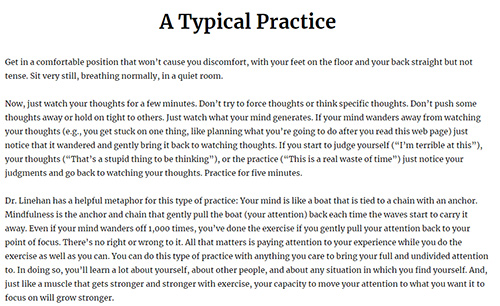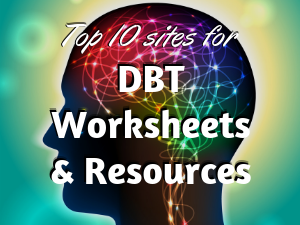Opposite To Feelingdialectical Behavioral Training
Evaluation of behavioural skills training for teaching abduction-prevention skills to young children. Journal of Applied Behavior Analysis, 38, 67-78. Miles, N.I., & Wilder, D.A. The effects of behavioral skills training on caregiver implementation of guided compliance. Journal of Applied Behavior Analysis, 42(2), 405-410. In short, checking the facts helps. If I’m not absolutely sure that an emotion is justified by the facts, and I have a habitual problem behavior that I want to change, it’s a good idea to experiment with Opposite to Emotion Action, and to get help from therapy and possibly a DBT Skills Training.
Dialectical Behavioral Therapy For Children
Emotions are neither good or bad, they are essential for survival. Emotions help us to defend ourselves (anger and jealousy), to protect ourselves (fear, shame, disgust), to connect with other beings (love), to motivate (envy) and to live according to our values (guilt). Emotions do this by triggering an urge to do something.
Human beings (and sometimes other mammals) are sensitive. Thoughts (interpretations) produce an instant biochemical response. Our brains, eyes, skin tone (and usually our facial expressions) change instantly. And we feel an urge to take action. All this happens before we’re even aware of an emotion. The “action urge” is powerful. We find ourselves taking action before we assess the efficacy of the action. Sometimes this is very helpful. If I see a tiger running towards me, it’s beneficial that I take action immediately, without stopping to think about what to do. I don’t need to make an interpretation; I just need to get to safety. But if someone cuts me off on the freeway, and I feel angry and an urge to retaliate, that may create problems for me (like possible death!). That is a good time to do the opposite to the emotion action (urge).
People may have trouble in life because they take action on their emotion urge before using Wise Mind and other mindfulness skills.
We all do Opposite Action on many occasions. If the Walgreen’s clerk is irritating me (my anger might be justified, I’m in a hurry, the clerk is chatting with her friend instead of helping me), I generally don’t yell at her. My emotion is justified but the intensity is not. I moderate the action urge to yell at her, and I use interpersonal skills to effectively get her attention. We do ok, perhaps, in situations like that. But many people don’t do Opposite Action when the urge is very strong. Then life gets harder – “I don’t feel like getting out of bed to go to work,” = I lose my job. “I feel like people don’t like me” = I avoid people and am lonely. When my girlfriend breaks up with me, I feel like hurting or killing myself = ….
How to do Opposite Action:
- Use Mindfulness to notice the emotion, the action urge (and, if possible, the prompting event and the interpretations of the prompting event).
- Ask yourself, is this emotion justified or unjustified?
- Don’t suppress the emotion, when we suppress emotions, they just get bigger. Emotions are not the problem – urges and/or intensity are the problems.
- sk yourself, if the emotion is justified, if the intensity of the emotion is justified or helpful. If the emotion is not justified or the intensity of the emotion is not helpful:
- Do the opposite of the emotional urge.
- Do all the way Opposite Action.
How to figure out if an emotion is justified? This takes some study of emotions. Again, we need emotions for survival. But we are complex. If I have a thought about an event, the thought is not necessarily a fact, even though it feels like it is. In short, checking the facts helps. If I’m not absolutely sure that an emotion is justified by the facts, and I have a habitual problem behavior that I want to change, it’s a good idea to experiment with Opposite to Emotion Action, and to get help from therapy and possibly a DBT Skills Training group.
An example: A shy person might be lonely and might feel Shame and Fear when he goes to social gatherings, which comes from thoughts like “people don’t like me,” “I don’t know how to talk to people,” “I never have a good time at parties,” etc., etc., etc. Is Shame justified? Shame fits the facts of a situation when you will be cast out/rejected by an important group or person if attributes of yourself or your behavior are made public. Is Fear justified? Fear is justified whenever the situation is a threat to your life, your health or your well being. What can the shy person do?
- The partygoer can use Wise Mind to figure out if he will be cast out or rejected if he goes to the party or if his life, health or well-being will be threatened.
- If the partygoer thinks that he might be tolerated and relatively safe at the party, he can use Opposite Action and go.
- Once there, the shy person needs to use All the Way Opposite Action: He needs to approach people, to avoid thoughts like “I hate parties,” “No one likes me,” and so on. If he goes to the party and stands alone in the corner, the partygoer is NOT doing Opposite Action.
This is a simple explanation of what could be a complex problem, informed by years of painful experiences. By practicing Opposite Action, the partygoer is beginning to change his brain and will begin to notice a reduction in Shame, an emotion that might be especially painful and not really justified in his life. (The partygoer is also practicing Exposure. Exposure to the things we’re afraid of is the antidote for fear and shame.) Opposite Action, a powerful skill taught in DBT Skills Training groups, can help him to have a life worth living.
This is a very basic outline list of the DBT skills for convenient reference. For a complete list with links to where they appear on the website, click here.
Learning to be mindful, to focus, to breathe will help make the application of the modules be more effective. It is paramount to your success in reducing stress and coping.
Remember: Sometimes the skills will not work. This is when you need to quickly go to the Distress Tolerance module and take taking a vacation from the situation that you are in, practice radical acceptance, do a lot of self soothe, and distract activities.
The key to success is the practice of DBT skills.
Overview of DBT skills (4 basic modules)
MINDFULNESS (Wise Mind)
Using the What Skills:
Using the How Skills:
DISTRESS TOLERANCE
Using Crisis Survival: Distraction with Wise Mind Accepts
Using Self Soothe with five senses:


Using Improve the moment:
Using Pros and Cons
Using Accepting Reality:
Willingness
Turning your mind
Radical Acceptance
EMOTION REGULATION
Using Reduce Vulnerability: (Please)

Using Build Mastery
Build Positive experiences
Be mindful of current emotion
Opposite to emotion action
INTERPERSONAL EFFECTIVENESS
Using Objectiveness effectiveness: (Dear Man)
Dialectical Behavioral Therapy Dbt Techniques
Using Relationship Effectiveness: (Give)
Self-respect effectiveness: (Fast)
What Is Dialectical Behavior Therapy
